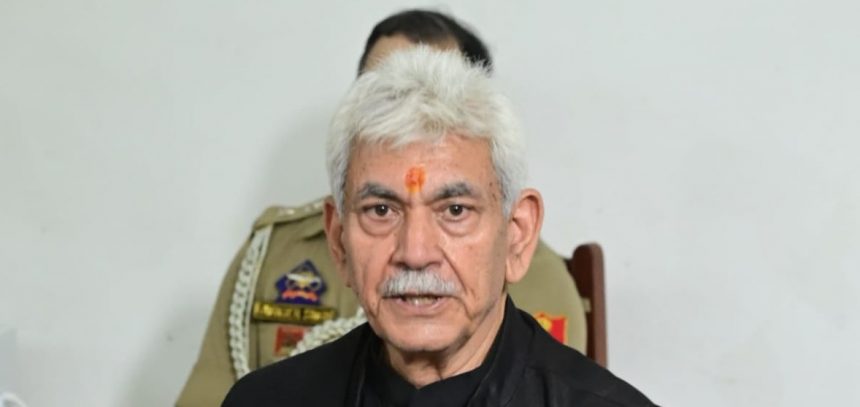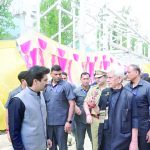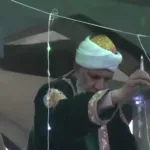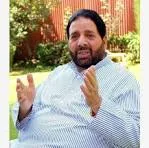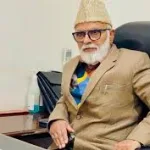Jammu, June 14: In a candid and defining moment at the closing ceremony of the Viksit Krishi Sankalp Abhiyan, Lieutenant Governor Manoj Sinha responded to Education and Social Welfare Minister Sakina Itoo’s appeal for greater government support.
“Sakina Ji made a heartfelt request, saying the LG should announce a new agriculture related project or policy . All I can offer is ‘security’—everything else, from roads and electricity to water and agriculture, now lies with the elected government. But let me assure you,” he continued, “if your government acts, there will be no obstruction from my side.”
But behind the levity lay a clear message: with democratic institutions restored, responsibility for key developmental sectors like agriculture, infrastructure, and public services now lies squarely with the elected government.
Highlighting Jammu and Kashmir’s ambitious agricultural goals at the closing ceremony of the Viksit Krishi Sankalp Abhiyan, held at the Mountain Research Centre for Field Crops at SKUAST Kashmir in Khudwani, Kulgam., LG Sinha unveiled the Holistic Agriculture Development Programme (HADP), a pioneering integrated roadmap launched in 2022 aimed at transforming the agricultural landscape. “Our goal is to build a resilient and prosperous Rs 1 trillion agricultural economy by 2030,” he said.
Calling agriculture the “backbone of self-reliance,” the Lieutenant Governor stated, “As India moves towards becoming a Viksit Bharat by 2047, Jammu & Kashmir’s farmers must be at the forefront of this journey. Let every field bloom with prosperity, every farmer thrive with dignity, and every village become a symbol of development. With Sankalp comes Shakti, and with Shakti comes Vikas,” he said.
The Lieutenant Governor lauded the valuable contribution of those associated with the Viksit Krishi Sankalp Abhiyan for marking a transformative step, through this initiative, toward building a resilient, modern, and prosperous agricultural landscape in the Union Territory.
While the national Viksit Krishi Sankalp Abhiyan launched on May 29 officially concluded on June 12, Jammu and Kashmir was granted a two-day extension due to Eid celebrations, allowing the UT to hold its valedictory function on Friday. During the campaign, according to SKUAST Kashmir and the Agriculture Department, officials directly engaged with over 2.8 lakh farmers across 4,500 villages to promote sustainable and profitable farming.
Positioning Jammu & Kashmir as a national example, Sinha noted that the region had initiated its own farmer-centric transformation long before the nationwide campaign began. “Three years ago, a similar initiative was launched here, and today, the Jammu & Kashmir model is being discussed across the country,” he said. “It is now being emulated in other states, and our farmers are leading this quiet revolution.”
Addressing the gathering, Sinha said that J&K had already taken the lead back in 2022 by launching HADP—a pioneering and integrated agricultural roadmap. Designed by scientists, department officials, and university leaders, the programme lays out 29 interlinked projects with the aim of doubling the agri-sector GDP to ₹1 lakh crore by 2030.
“We were not content with piece-meal reforms. From oilseeds to livestock, from milk to pulses, every sector has been addressed through a comprehensive model,” the LG said. “Mustard cultivation, which was on just 400 hectares in the Valley in 2021, now covers over 5,000 hectares. This isn’t just about oil; it supports fodder, beekeeping, and soil health too.”
He commended SKUAST-K for developing 20 rice varieties suited to Kashmir’s climate and acknowledged the university’s work in releasing quality seeds through the newly established Shalimar Seed Company, which he called a “game-changer” for regional farmers.
During the event, several progressive farmers shared their experiences with the new schemes. A young farmer from a Scheduled Tribe suggested that horticulture too should be brought under the PM Fasal Bima Yojana.
Agreeing in principle, the LG urged the Agriculture Minister to prioritise expanding crop insurance coverage to the horticulture sector.
Emphasising participatory governance, Sinha said, “Policies should not be made in secretariats alone. They must be forged in fields, in dialogue with farmers. The connection from lab to land and from seed to market is what drives real change.”
He also highlighted inclusive growth, especially among tribal communities like Gujjars, Bakarwals, and Paharis. Land rights have been granted, and 4.69 lakh women have been connected to integrated farming and livestock management, leading to the creation of over 225,000 agri-nutrition gardens and 40 integrated farming clusters.
So far, the Viksit Krishi Sankalp Abhiyan has reached over 2.80 lakh farmers in J&K, with demonstrations, farmer interactions, and awareness on sustainable techniques. Over 17 mandis have been integrated into the electronic National Agricultural Market (e-NAM), facilitating trade worth over ₹1,050 crore.
“Let this not just end in ceremonies and reports,” the LG cautioned, “but let its goals echo in our governance systems.”
Under HADP, the milk processing capacity has increased sixfold, and fish production has risen by 33%, with prawn production doubling. Cold storage capacity in the UT has also more than doubled since 2020.
The LG also handed out sanction letters to tribal farmers under various schemes and released publications from SKUAST Kashmir. A two-minute silence was observed to honour those who lost their lives in the recent Pahalgam terror attack.
Sinha closed his address with a pointed reminder: “Development and prosperity come only with peace. In its absence, neither is possible. It’s not just the job of police or security forces; every citizen has a role to play.”
Quoting Sheikh-ul-Alam, he said, “Annposhi teli wanposhi”—Food security depends on forest health. “We are committed to preserving our ecological wealth while empowering those who live closest to it,” he said.
With the Kharif season officially underway, the Lieutenant Governor reiterated his commitment to transforming agriculture in Jammu & Kashmir. “We must ensure no farmer is left behind. This is not just a campaign—it’s a mission,” he concluded.
Prominent among those present included Javid Ahmad Dar, Minister for Agriculture Production, Rural Development & Panchayati Raj; Sakina Itoo, Minister for Education, Health & Medical Education and Social Welfare; Dr Mandeep K. Bhandari, Principal Secretary to Lieutenant Governor; Prof Nazir Ah. Ganai, Vice Chancellor SKUAST Kashmir; VK Birdi, IGP Kashmir; scientists, experts, faculty, students, and members of the farming community. Also present were Mohd Afzal Parray, Chairman, DDC Kulgam; Members of Legislative Assembly, HoDs, and prominent citizens from various walks of life.


